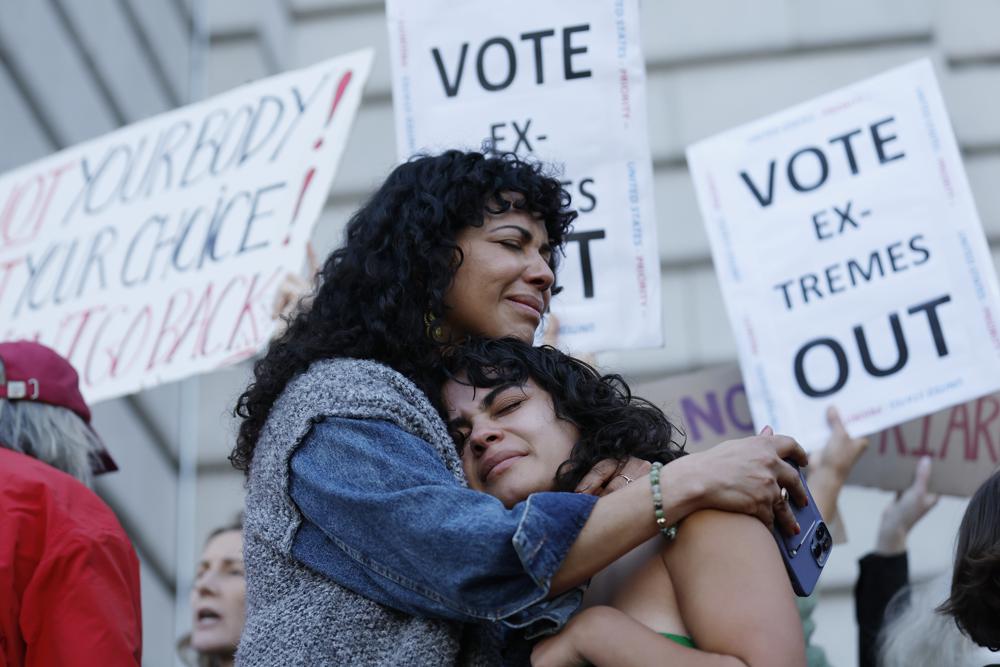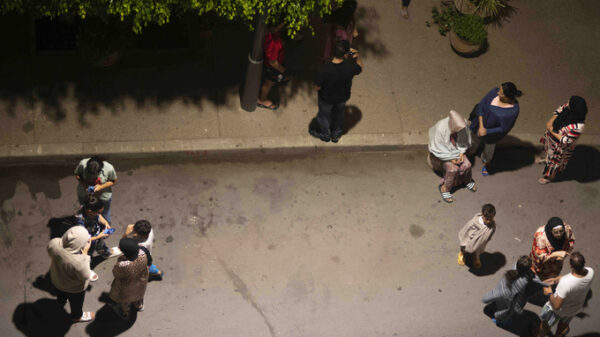Mitzi Rivas, left, hugs her daughter Maya Iribarren during an abortion-rights protest at City Hall in San Francisco following the Supreme Court’s decision to overturn Roe v. Wade, Friday, June 24, 2022. The U.S. Supreme Court’s decision to end constitutional protections for abortion has cleared the way for states to impose bans and restrictions on abortion — and will set off a series of legal battles. (AP Photo/Josie Lepe)
NEW ORLEANS (AP) — Abortion bans were temporarily blocked in Louisiana and Utah, while a federal court in South Carolina said a law sharply restricting the procedure would take effect there immediately as the battle over whether women may end pregnancies shifted from the nation’s highest court to courthouses around the country.
The U.S. Supreme Court’s decision Friday to end constitutional protection for abortion opened the gates for a wave of litigation. One side sought quickly to put statewide bans into effect, and the other tried to stop or at least delay such measures.
Much of the initial court activity focused on “trigger laws,” adopted in 13 states that were designed to take effect swiftly upon last week’s ruling. Additional lawsuits could also target old anti-abortion laws that were left on the books in some states and went unenforced under Roe. Newer abortion restrictions that were put on hold pending the Supreme Court ruling are also coming back into play.
“We’ll be back in court tomorrow and the next day and the next day,” Nancy Northup, president and CEO of the Center for Reproductive Rights, which argued the case that resulted in the high court ruling, said Friday.
Rulings to put trigger laws on hold came swiftly in Utah and Louisiana on Monday, and a hearing was scheduled for Tuesday as Texas clinics seek assurances they can resume services for at least a few more weeks without risking prosecution.
A Utah judge Monday blocked that state’s near-total abortion ban from going into effect for 14 days, to allow time for the court to hear challenges to the state’s trigger law. Planned Parenthood had challenged the law, which contains narrow exceptions for rape, incest or the mother’s health, saying the law violates the equal protection and privacy provisions in the state constitution.
“I think the immediate effects that will occur outweigh any policy interest of the state in stopping abortions,” Utah Judge Andrew Stone said.
In Louisiana, a judge in New Orleans, a liberal city in a conservative state, temporarily blocked enforcement of that state’s trigger-law ban on abortion, after abortion rights activists argued that it is unclear. The ruling is in effect pending a July 8 hearing.
At least one of the state’s three abortion clinics said it would resume performing procedures on Tuesday.
“We’re going to do what we can,” said Kathaleen Pittman, administrator of Hope Medical Group for Women, in Shreveport. “It could all come to a screeching halt.”
Louisiana Attorney General Jeff Landry, a Republican and staunch abortion opponent, vowed to fight the judge’s ruling and enforce the law.
“We would remind everyone that the laws that are now in place were enacted by the people through State Constitutional Amendments and the LA Legislature,” Landry tweeted Monday.
In South Carolina, a federal court lifted its prior hold on an abortion restriction there, allowing the state to ban abortions after an ultrasound detects a heartbeat, usually around six weeks into a pregnancy, before many women know they are pregnant. There are exceptions if the woman’s life is in danger, or if the pregnancy is the result of rape or incest.
Planned Parenthood said after the ruling that it will continue to perform abortions at its South Carolina clinics within the parameters of the new law.
Also Monday, abortion rights advocates asked a Florida judge to block a new law there that bans the procedure after 15 weeks with some exceptions to save a mother’s life or if the fetus has a fatal abnormality, but no exceptions for rape, incest or human trafficking. The ACLU of Florida argued that the law violates the Florida Constitution. A ruling on that is expected Thursday — a day before the law is scheduled to take effect.
Abortion rights activists also went to court Monday to try to fend off restrictions in Texas, Idaho, Kentucky and Mississippi, the state at the center of the Supreme Court ruling, while the American Civil Liberties Union of Arizona filed an emergency motion there on Saturday seeking to block a 2021 law they worry can be used to halt all abortions.
In Friday’s ruling, the Supreme Court left it to the states to decide whether to allow abortion.
“The expectation is that this will result in years of legislative and judicial challenges,” said Jonathan Turley, a professor at the George Washington University law school.
As of Saturday, abortion services had stopped in at least 11 states — either because of state laws or confusion over them.
In some cases, the lawsuits may only buy time. Even if courts block some restrictions from taking hold, lawmakers in many conservative states could move quickly to address any flaws cited.
That’s likely to be the case in Louisiana. The plaintiffs in the lawsuit filed in state court don’t deny that the state can now ban abortion. Instead, they contend Louisiana now has multiple, conflicting trigger mechanisms in the law.
They also argue that state law is unclear on whether it bans an abortion prior to a fertilized egg implanting in the uterus. And while the law provides an exception for “medically futile” pregnancies in cases of fetuses with lethal abnormalities, the plaintiffs noted the law gives no definition of the term.
Now that the high court has ruled that the U.S. Constitution does not guarantee the right to an abortion, abortion rights groups are seeking protection under state constitutions. Challenges to trigger laws could be made on the grounds that the conditions to impose the bans have not been met, or that it was improper for a past legislature to bind the current one.
James Bopp Jr., general counsel for the National Right to Life Committee, said the wave of suits from abortion rights advocates is not surprising. “We know that the abortion industry has basically unlimited funds, and its allies have basically unlimited funds, and of course they’re fanatical about abortion on demand throughout pregnancy,” Bopp said in an interview.
But he said that that the Supreme Court ruling should preclude abortion rights supporters from prevailing in any federal challenges. And he called efforts based on state constitutions “fanciful.”
Still other cases could be filed as states try to sort out whether abortion bans in place before Roe was decided — sometimes referred to as “zombie laws” — apply now that there is no federal protection for abortion.
For instance, Wisconsin passed a law in 1849 banning abortions except to save the life of the mother. Attorney General Josh Kaul, a Democrat, said he does not believe it is enforceable. Abortion opponents have called on lawmakers to impose a new ban.
In the meantime, Planned Parenthood of Wisconsin said it immediately suspended all abortions.
In Michigan, Planned Parenthood challenged a 1931 abortion ban ahead of last week’s Supreme Court ruling. In May, a judge said the ban could not be enforced because it violates the state’s constitution. Abortion rights supporters are now trying to get a proposed state constitutional amendment on the ballot in November to protect abortion and birth control.
Idaho, Oklahoma and Texas have adopted laws that allow people to seek bounties against those who help others get abortions. It is an open question as to whether that means people can be pursued across state lines, and legal challenges over the issue are likely to come up in cases of both surgical abortions and those involving medicine mailed to patients.
The California Legislature, controlled by Democrats, passed a bill Thursday to shield abortion providers and volunteers in the state from civil judgments imposed by other states. In liberal Massachusetts, Gov. Charlie Baker, a Republican, signed an executive order Friday that prohibits state agencies from assisting other states’ investigations into anyone who receives a legal abortion in Massachusetts. Rhode Island’s Democratic governor said he would sign a similar order.
Forliti reported from Minneapolis and Mulvihill from Cherry Hill, New Jersey. Associated Press writers Samuel Metz in Salt Lake City; Jeffrey Collins in Columbia, South Carolina; Anthony Izaguirre in Tallahassee, Florida; and other AP reporters throughout the U.S. contributed to this report.
Copyright 2021 Associated Press. All rights reserved.




























